People have short memories. They barely notice slow changes, because they are always moving on, without paying any real attention to a place on a regular basis. Recognition of the value of nature suffers because of this deficit in human awareness. Increasingly people are living in urban areas, in a permanent state of unease, in a space and a time that overshadows nature. In the deceptive safety of the city, nature is used merely for decorative purposes. A tree here and an avenue there, seemingly refuges of peace and quiet, such as Central Park in New York and the Botanical Gardens in Lisbon. What we see happening right now in Venice is actually a process that has been going on for a generation, or for more than 25 years. The sea level is rising: firstly it was by only a few imperceptible centimetres a year, beginning in 2002, and then there were sudden peaks, like the full moon high tide of 1 December, 2008, and then also 25 December, 2009, and 11 November, 2012, always during the winter.
The millions of tourists aren’t bothered by this. They visit the city as if they were going to a water adventure park. And, when there are floods, they appear in wellington boots. But the inhabitants of Venice were frightened by the high tides of 29 October, 2018, and 12 November, 2019, which are gradually making the city disappear into the salty waters of the Mediterranean. This is because the sometimes slow, sometimes rapid, chaotic rise in water levels is causing the city to sink into the sea, and also because the port administration is digging a channel 18 metres deep to increase navigability for ever larger cruise ships. And with every metre they dig down, the foundations of the city drop a few more inches. How much longer can they risk doing this for? Will Venice have the same fate as Pompeii? Will it completely disappear from the map?
I’m going to go for a walk and continue thinking about the city of Venice. My journey starts at Lagoa dos Salgados, in Praia Grande, the last bird reserve in the Algarve, and I have views over Praia da Galé, Praia do Castelo and to the east towards Albufeira.
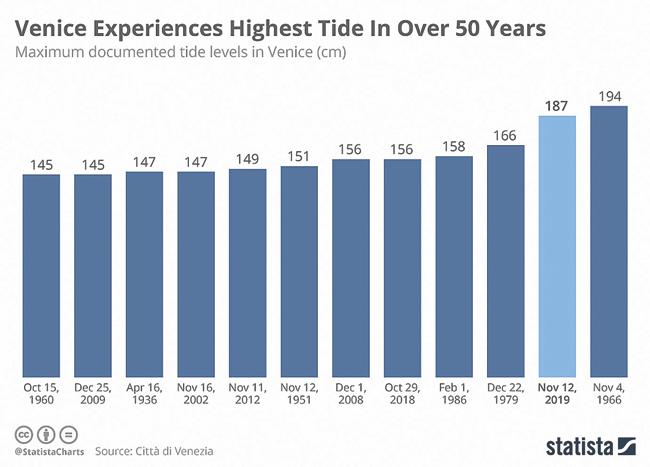
Vilamoura International School recently won a prize with this ECOTRAIL in a competition between Portuguese schools. We are going to test this route bearing in mind that, sooner or later, SALGADOS will also be flooded by the sea. And the Millennium BCP bank intends to build a resort right here, supposedly an ECO affair, whose plan has already been completed and is being marketed internationally by the multinational real estate company CBRE, even though the first stone hasn’t even been laid. The building permit was issued on 1 July, 2016, by Silves Municipal Council. What is holding back this transformation of nature into a tourist resort? Is it the diversity of the birdlife? Would it be the cormorants, flamingos, coots or herons? 200 million euros are at stake and are to be buried here. We are a group of more than 30 people, most of them students from Professor Luca’s class, from Manteigas, in the Serra de Estrela.
When we founded ECO123, in early 2013, the word ECO still made people turn up their noses. We never thought that the word ECO would become so fashionable. To us, the word ECO is an abbreviation for Economy based on Ecology… But now if you sell several hotels and 300 houses and apartments under the umbrella of an ECO-Resort, and even have an ECO-trail, this already sounds like a joke in bad taste. So the students observe the various birds from the bird hide. Photographers from all over the world even come to Salgados. It’s Wednesday, the day dedicated to ECOlogia at Vilamoura International School. With the new direction of the Algarve Regional Tourism Board (RTA), which now also encompasses ECO-tourism, you want to earn good money. That is the goal, to make money. How would it be if, right from the start, many years ago, a pedestrian path had been made along the coast from Vila Real de Santo António, passing through Salgados to Cape Saint Vincent, instead of the entire Algarve coast having been urbanised? Because there really are people who like to walk, to move about and admire nature and the most beautiful coast in Europe. One could create something for those who already live here, which travellers would also like to discover later on, rather than just focus on profits from tourism.
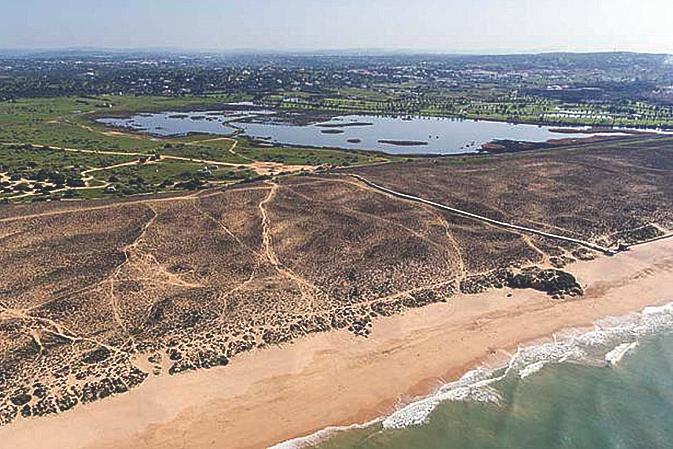
Salgados is three metres above sea level. Quarteira and Vilamoura are too, and the port of Albufeira and the underground carparks in Portimão and Lagos are even three metres below sea level … and where do I intend to go with this? You might want to take a closer look at the landscape before you start building, or rather before investing in a future in Salgados. Who wants to invest in a property next to the lagoon today, so that tomorrow they have to leave the house from the first floor, rowing back to land so as not to get their trousers wet? It doesn’t seem a good investment to us. Along the coast, the sea level is rising, in the mountains the forests are burning- so the evil is well distributed. And this is because man-made climate change will take us all on a trip that isn’t sponsored by the RTA or sold to us by TUI.
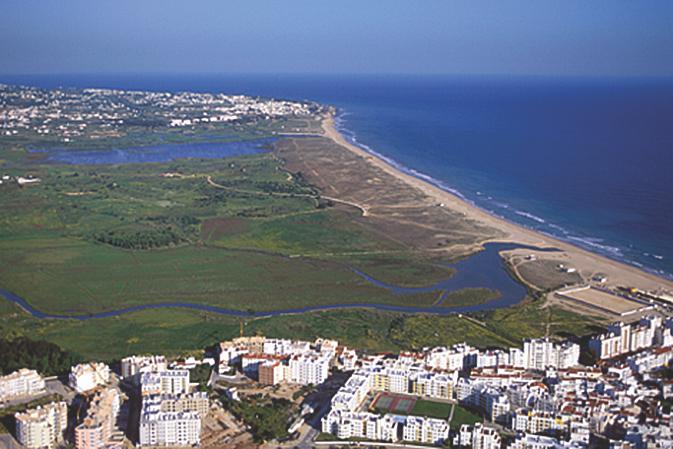 There is no trip by cruise ship, nor any nature tourism that can hide the fact that tourism itself is a bottomless pit in which a return flight for the holidays is enough to emit one or two tons of carbon dioxide. Why do people look for happiness in money? Why do they always have to be travelling? Is it because they don’t feel good staying at home? Building a mega resort makes as little sense as going in a rocket to Mars in the hope of finding a planet somewhere that has similar living conditions to the Earth. We could save a lot of energy (and I remember this whilst the beauty of nature and the golden rocks resonate within me, if we make our homes comfortable) then we can look upon travelling as something special and unique, rare, exclusive and beautiful, that will stay with us for the rest of our lives and which we can tell our children and grandchildren about. Because there are stories that are a dream, but tourism sells them like soap bubbles, which, after 7 or 14 days, end with a flight back to day-to-day life which begins with the alarm clock ringing and waking us up like robots every morning and makes us function the same way as everyone else. It’s a game that sticks in our minds. People have a short memory.
There is no trip by cruise ship, nor any nature tourism that can hide the fact that tourism itself is a bottomless pit in which a return flight for the holidays is enough to emit one or two tons of carbon dioxide. Why do people look for happiness in money? Why do they always have to be travelling? Is it because they don’t feel good staying at home? Building a mega resort makes as little sense as going in a rocket to Mars in the hope of finding a planet somewhere that has similar living conditions to the Earth. We could save a lot of energy (and I remember this whilst the beauty of nature and the golden rocks resonate within me, if we make our homes comfortable) then we can look upon travelling as something special and unique, rare, exclusive and beautiful, that will stay with us for the rest of our lives and which we can tell our children and grandchildren about. Because there are stories that are a dream, but tourism sells them like soap bubbles, which, after 7 or 14 days, end with a flight back to day-to-day life which begins with the alarm clock ringing and waking us up like robots every morning and makes us function the same way as everyone else. It’s a game that sticks in our minds. People have a short memory.

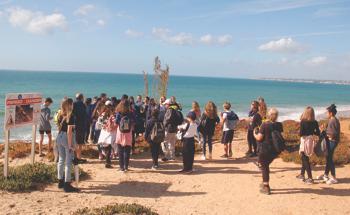
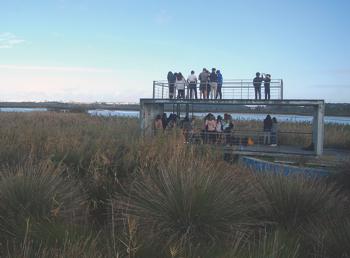
 Eco123 Revista da Economia e Ecologia
Eco123 Revista da Economia e Ecologia

